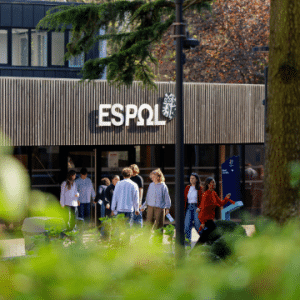This prize is awarded for the best undergraduate research work and the best Master’s dissertation.
Congratulations to 2024 Susan Strange Prize winners!

The European School of Political and Social Sciences (ESPOL) and its research laboratory, ESPOL-Lab, are delighted to congratulate the winners of the Susan Strange 2024 Prize. It rewards academic excellence in the field of political science. The prize, named after the famous British political scientist Susan Strange, honours the research work of our students at both undergraduate and postgraduate levels.
A competition of excellence
Aimed at rewarding the best Master’s dissertation and the best undergraduate research paper, the Susan Strange Prize recognises outstanding work carried out during the 2023-2024 academic year. To be eligible, candidates had to have achieved excellent marks, i.e. at least 15/20 for Masters dissertations and 17/20 for undergraduate research projects.
After a rigorous pre-selection process, the students wishing to compete submitted a presentation of their work to a panel of figures from ESPOL teaching and research. The jury, chaired by Raul Magni-Berton, Deputy Director of Scientific Affairs at ESPOL, and Benjamin Bourcier, Deputy Director of ESPOL-Lab, deliberated before selecting the winners.
Congratulations to the winners of the Susan Strange 2024 Prize
After careful evaluation, the jury awarded the Susan Strange Prize to a Master’s thesis and a Bachelor’s thesis. These works stand out for their quality, originality and academic rigour. The commitment of the winners, their passion for research and their ability to tackle complex issues have made their work a genuine contribution to the field of political science.
Best Master’s thesis :
Patricia, Master International and Security Politics for her dissertation: Distant Yet Strategic: Explaining Patterns of The European Union’s Declaratory Diplomacy on The South China Sea Dispute.
Best undergraduate research file :
Karisma Maran, Bachelor’s degree in International Relations, for her dissertation: Political Instrumentalisation of Famine. A Comparative Analysis of 1943 Bengal Famine & 1983 Sudan Famine.
Runner-up :
Candice De Vulpillieres, Bachelor’s degree in International Relations, for her research paper: From global policy to local practice: Assessing the long-term effects of neoliberal reforms on education in sub-Saharan Africa – Case studies of Ghana and Ethiopia.
Third place went to :
Marie Gayerie, Bachelor’s degree in Political Science, for her research paper: Between opportunism and political rationality: a study of the Citizens’ Climate Convention in France, from its inception to its implementation.
The Susan Strange Prize: a commitment to the future
These students have distinguished themselves by their academic excellence, methodological rigour and the originality of their work. The Susan Strange Prize, endowed with €1,000 for each winner, highlights their significant contribution to political science and international relations.
We warmly congratulate Patricia, Karisma, Candice and Marie on their outstanding achievements and commitment to research. Their work illustrates the quality of training at ESPOL and the richness of the academic debates that animate our institution. We wish them a brilliant career and are convinced that they will inspire future generations of students.
See you in 2025 for another edition of the Susan Strange Prize!




